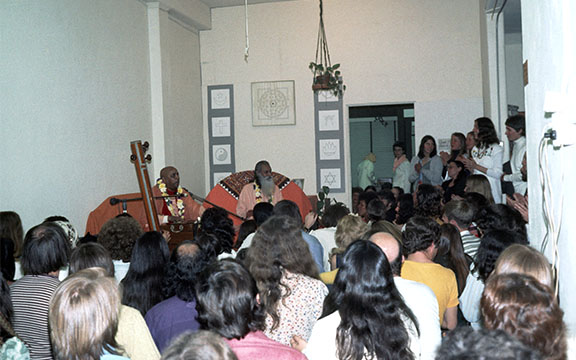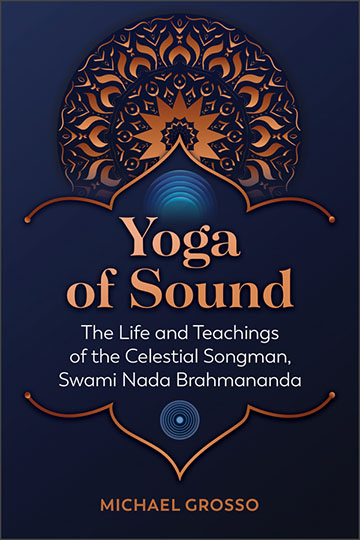
Photo: Swami Nada Brahmananda sharing his musical mastery with Swami Satchidananda at an Integral Yoga Center, 1970s.
In 1971, Michael Grosso had an extraordinary experience in Greenwich Village, New York, that led him to realize he needed to balance his overly intellectual life with music. Michael had just spent the last several years obtaining a Ph.D. in philosophy from Columbia University when he met Swami Nada Brahmananda, a former court musician for the King of Mysore, famous throughout India for being a master of Taan music and Nada Yoga (the Yoga of Sound), as well as for his supernatural control of his body.
Sri Swamiji was a disciple of Sri Swami Sivanandaji, founder of the Divine Life Society in Rishikesh, India. Swami Nada Brahmananda was also a brother monk of Swami Satchidananda, who he often hosted to give classes in Nada Yoga and table at Integral Yoga Institutes and Ashrams in the 1970s.
Grosso began studying with Swami Nada Brahmananda and found his life profoundly changed. Sharing the lessons of Sri Swamiji, as well as painting a vivid portrait of New York City in the 1970s—and its vibrant and chaotic underground arts and music scene—Grosso explores Sri Swamiji’s approach to Nada Yoga in depth in his new book Yoga of Sound: The Life and Teachings of the Celestial Songman, Swami Nada Brahmananda. He reveals how the tradition centers on the sound or vibration that created the universe, its personal cultivation, and its power to heal, enlighten, and offer insight about how to live in the Kali Yuga.
Grosso also examines the siddhis, or extraordinary powers, that can arise from this work, detailing the otherworldly abilities of his Yoga and music master. The lessons that Grosso shares center on three life-enhancing themes: controlling the mind, which provides the very essence of a happy life; diet and practices conducive to healing and perfect health—Swami Nada Brahmananda himself never knew a day of sickness in all of his 97 years; and how music in all its forms can be used to transform consciousness and enrich our spiritual life. Revealing Swami Nada Brahmananda as the very embodiment of a Celestial Songman, Grosso shows how, by practicing the Yoga of sound, we can embody Swami Nada’s greatest lesson of all: that we can all learn to make music from the discordant notes of our lives and sing our way out of the Kali Yuga. Here is an exclusive excerpt from his new book:
According to the Indian guru, life is a journey in the school of self-transformation. My feelings toward the metaphor were mixed: I liked it because it hinted at great vistas of experiment and experience; at the same time, I had misgivings. I’ve never been a very good student. I manage but always blunder along in my own eccentric way.
“Not use correct,” my new teacher announced. “What you getting? Punishment, eighty-four million lives going again. Pass examination, you get degree. Fail, very bad! Very bad!”
“Really?” I said, starting to squirm a little. Did I really have to go back to school? Could it really take eighty-four million lives before I graduate? I thought I had escaped school once and for all.
At my desk in grade school, I excelled in gazing at clouds adrift in the sky. I felt a secret kinship with their aimless movements. I tried to explain to Nada that I was a rebellious student, and never showed up at any of my graduation ceremonies, high school or college. Music to me was the sound of the bell shouting that class was over. Nada smiled and put his hand on my shoulder. “Practice music, Michael,” he said earnestly, “this is not entertainment, not for others—this is for your Self.” When he actually said, “Practice music, Michael,” I instantly remembered what Socrates was told in his recurrent dream: “Make music, and practice hard!”
Nada described all the advantages that would accrue if I followed the path he said was true and best. To begin with, health and happiness would be mine. The main thing was to obey the rules in the art of living and to secure a right understanding of the fundamental principles. The rest was just practice—again, I recalled Socrates who said that philosophy was a form of “practice” (melete, in Greek). In the end, I’d be able to smile in the face of life and death, like a real master, comfortably one with my higher Self.
Nada explained that unenlightened death was like going through a revolving door that let you back in the same Big Department Store with countless rooms and myriads of distracting commodities to suck you in. He made a comical gesture of trying to get out through the door but always being pushed back in. He gaped at me with mock astonishment. Through all this rap the drone of the harmonium was continuous, as if to underline the constancy of the all-witnessing Self through the endless comings and goings, appearings and disappearings, of our time-tossed existence.
He sang a little more, then broke in on himself, fingers still dancing over the keys of the harmonium. Musing on the words of the song, he said: “Flowers, very beautiful; face, very beautiful—what you getting? Cemetery!” and resumed singing a tempo. Gee, I thought, that wasn’t exactly an upbeat intermezzo. 
An elderly lady who spoke with a French accent entered without knocking. “Come in mother,” Nada said, whose custom, I would learn, was to address all women as “mother.” My time was finished. I got up and the French lady sat down beside Nada, praising him effusively, pawing him as if he were a teddy bear. “Isn’t he marvelous?” she said, peering up at me with unabashed awe. “You are marvelous,” she said again, turning to Nada, clutching him wantonly, “you just know you are.”
I detected pique in his eyes, but he allowed the good-natured matron to envelop him with her affection. “You do keep yourself well—come here,” she said to me, “look at his teeth—what amazing teeth!”
The affable monk opened his mouth, smiled primly, and displayed his teeth. Dazed, and feeling a bit giddy, I stumbled out the door, thanking Swami Nada for the rigorous, enlightening lesson. Half-way down the stairs it occurred to me I forgot to leave the ten dollars for my lesson. Alida mentioned that four of the ten went to Nada and Parvati [his disciple and assistant]—not much—and the other six to the True World Order, or, as devotees called it, the Organization. I went back and placed a ten dollar bill on top of the bureau. Nada’s face brightened when I stepped in, apparently unaware of the reason, and said as I left the second time: “From now on you going up! . . . up! . . .up!”
About Michael Grosso:
Michael Grosso earned his doctorate in philosophy from Columbia University. He has taught at City University of New York, Kennedy University in California, and City University of New Jersey. The author of several books, including most recently Smile of the Universe, he lives in Charlottesville, Virginia.
(Excerpt from Yoga of Sound: The Life and Teachings of the Celestial Songman, Swami Nada Brahmananda, by permission of the publisher, InnerTraditions.)

